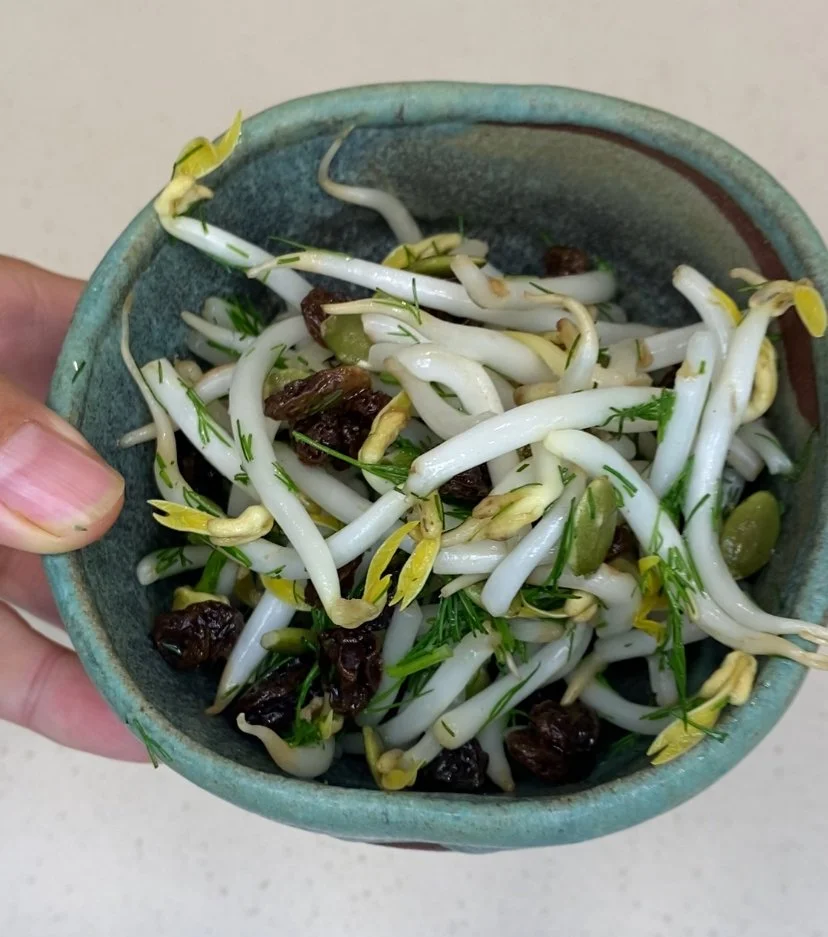When the summer sun climbs high and the heat begins to intensify, our bodies instinctively crave foods that are light, hydrating, and refreshing. In Ayurvedic terms, this is the season of Pitta dosha, governed by the elements of fire and water, and associated with transformation, digestion, and metabolism. However, too much heat, whether from the environment or lifestyle, can aggravate Pitta and lead to symptoms such as irritability, inflammation, heartburn, or overheating.
This Mung Bean Sprout Salad is a delicious and effective way to restore equilibrium during the hot months. It’s not only satisfying and packed with nutrients, it’s also energetically aligned with the cooling, calming, and rejuvenating needs of summer. The combination of sprouted mung beans, fresh dill, sweet raisins, mineral-rich pumpkin seeds, lemon juice, and just a touch of salt creates a harmonious balance of flavor, texture, and healing properties.
Ayurvedic Benefits of Mung Bean Sprout Salad
This salad is crafted with the principles of Ayurvedic seasonal eating in mind, using ingredients that calm excess Pitta while supporting digestive strength and hydration. Here’s how each ingredient plays a role:
Mung Beans
Sprouted mung beans are among Ayurveda’s most recommended foods for detoxification and nourishment. When sprouted, mung beans become easier to digest and higher in enzymes, B vitamins, and antioxidants. They are tridoshic, meaning they balance all three doshas, and especially pacifying to Pitta due to their light, sweet, and astringent qualities. Their water-rich content also helps combat dryness and dehydration during summer.
Fresh Dill
Dill is cooling, carminative, and gently bitter, which makes it ideal for Pitta balance. It supports digestion, reduces bloating, and stimulates agni (digestive fire) without overheating it. Its unique aromatic flavor brings a bright freshness that complements the sprouts perfectly.
Raisins
In Ayurveda, raisins are revered for their cooling and ojas-building properties. They nourish the blood, calm the nerves, and offer a sweet post-digestive effect (vipaka) that soothes an overheated system. Their soft texture and subtle sweetness also ground the salad emotionally and energetically.
Pumpkin Seeds
Pumpkin seeds are a rich source of zinc, magnesium, and healthy fats, which support skin health, immune function, and the nervous system. Though slightly warming, their astringent and grounding qualities make them balancing when used in moderation with cooling counterparts.
Lemon Juice
Though lemons are sour and may seem heating, they have an alkalizing effect post-digestion. Lemon enhances flavor, supports bile flow, and stimulates digestion in a gentle, Pitta-friendly way. It also preserves the freshness of sprouts when the salad is stored in the fridge.
Salt
A pinch of mineral-rich salt helps draw out flavors and supports electrolyte balance, critical in the summer heat when we sweat more. Rock salt or Himalayan pink salt is preferred in Ayurveda for its mildness and trace mineral content.
How to Make Mung Bean Sprout Salad
Ingredients
7 ounces mung beans, soaked and sprouted
1/2 cup loosely chopped fresh dill
1/2 cup raisins
1/4 cup pumpkin seeds
Juice of one lemon
Salt, to taste
Instructions
Soak mung beans overnight. Rinse, drain, and allow to sprout in a cool, dark place for 1–2 days, rinsing twice daily.
Once sprouted, rinse thoroughly and place in a bowl.
Add dill, raisins, pumpkin seeds, lemon juice, and salt.
Toss gently to combine.
Serve immediately or chill slightly for an even more cooling effect.
This salad can be enjoyed on its own as a light meal or served alongside kitchari, steamed rice, or a seasonal soup for a more complete plate.
The Science Behind the Nourishment
From a modern nutritional perspective, this salad is a powerhouse of plant-based protein, fiber, antioxidants, and anti-inflammatory compounds. Sprouted mung beans are high in folate and vitamin C, while pumpkin seeds supply magnesium and zinc—both essential for mood regulation and immune support. Dill contains monoterpenes with antioxidant properties, and raisins offer a healthy dose of natural sugars and iron.
All of these contribute to hydration, digestive ease, and stable energy, key pillars of health in both modern nutrition and Ayurveda. Because this meal is raw and enzymatically active, it also supports the microbiome, reduces internal heat, and gently detoxifies the system without depleting it.
Mindful Summer Eating: A Seasonal Ritual
In Ayurveda, how you eat is just as important as what you eat. Summer calls for slowing down, cooling off, and savoring simplicity. Eating with awareness during the Pitta season is not only a physical reset, it’s a spiritual one.
Mindful summer eating can include:
Starting the day with room temperature herbal teas like coriander-fennel-cumin or rose petal water
Eating your largest meal at midday, when agni is strongest
Avoiding overly spicy, salty, or fried foods, which aggravate Pitta
Pausing between bites to breathe, feel, and notice how food is landing in your body
Choosing fresh, local, water-rich foods to mirror the season’s natural abundance
Eating a salad like this under the shade of a tree or near a body of water, without screens or distractions, becomes an act of reverence, not just for your body, but for the earth and its rhythms.
Final Thoughts: Let Food Be Your Cooling Medicine
This Mung Bean Sprout Salad is more than a recipe, it’s an invitation. An invitation to realign with your body’s wisdom, to honor the season you’re in, and to nourish yourself in a way that’s both delicious and deeply therapeutic.
Whether you’re balancing a fiery constitution, recovering from travel, or simply seeking a meal that feels as good as it tastes, this salad is a simple yet potent way to bring Ayurvedic balance and summer vitality to your plate.
Disclaimer
The sole purpose of these articles is to provide information about the tradition of Ayurveda. This information is not intended for use in the diagnosis, treatment, cure or prevention of any disease.

